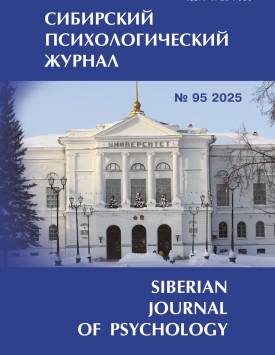The System of Socio-Psychological Determinants Influencing the Emergence of Propensity to Violent Extremism among Students
The problem of violent extremism remains relevant for modem society, posing a serious threat to its stability and security. A significant social danger is the involvement of young people, including students, in extremist movements. In this regard, the purpose of the study was to study the socio-psychological determinants that influence the tendency to violent extremism among students. The study involved 100 1st-2nd year students of the Chechen State Pedagogical University, aged 17 to 23 years. The following methods were used as diagnostic tools: “Diagnostics of dispositions of violent extremism” (D.G. Davydov, K.D. Khlomov), “Personal aggressiveness and conflict” (E.P. Ilyin), “Life satisfaction” (N.N. Melnikova), “Types and components of tolerance-intolerance” (G.L. Bardier), “Basic Beliefs Scale” (R. Yanoff-Bulman), “Structure of Ethnic Identity” (M.V. Vereshchagina), “Coping Behavior” in stressful situations CISS" (S. Norman, D.F. Endler, D.A. James, M.I. Parker), "Communication skills" (L. Michelson). Empirical results showed that the majority of students have an average level of severity of dispositions of violent extremism, however, a certain proportion of respondents (39%) demonstrate high values for at least one indicator, and 7% of respondents are characterized by high indicators for 3 or more dispositions, which classifies them as a “risk group”. Particular attention was paid to studying the influence of personal aggressiveness, life satisfaction and tolerance on the tendency of students to violent extremism. In the course of correlation analysis according to Ch. Spearman, significant connections were identified between high aggressiveness, low levels of life satisfaction and low levels of tolerance with a predisposition to extremism. Based on the results of the correlation analysis, the main socio-psychological determinants of an individual’s propensity to violent extremism were identified: aggressiveness as a personal characteristic, dissatisfaction with life, intolerance, the use of maladaptive coping strategies in stressful situations, destructive basic beliefs, problems in understanding and accepting one’s own and others’ ethnic identity , preference for aggressive communication skills. Based on the results obtained, it was concluded that it is necessary to develop and implement programs for psychological and pedagogical support and social adaptation of student youth, which will effectively counter the spread of extremist tendencies among young people and minimize the risks of their involvement in extremist activities.
Keywords
extremism,
student youth,
socio-psychological determinants,
aggressiveness,
dissatisfaction with life,
intolerance,
coping strategies,
basic beliefs,
ethnic identity,
communication skillsAuthors
| Madzhuga Anatoly G. | Institute for Educational Development of the Republic of Bashkortostan | madzhuga.anatolij@inbox.ru |
| Saidov Aslanbek A. | Chechen State Pedagogical University | aslsaidov@gmail.com |
Всего: 2
References
Буданов, С. А., Колесников, Р. В. (2022). Молодежный экстремизм: особенности структуры личности преступника. Вестник Воронежского института МВД России, 1, 139-145.
Верещагина, М. В. (2010). Этническая идентичность и этническая толерантность русских и осетинских студентов: дис. … канд. психол. наук. Владикавказ.
Давыдов, Д. Г., Хломов, К. Д. (2017). Методика диагностики диспозиций насильственного экстремизма. Психологическая диагностика, 14(1), 78-97.
Колмогорова, Л. А. (2015). Формирование коммуникативной компетентности личности. Барнаул: Алт. гос. пед. ун-т.
Крюкова, Т. Л. (2007). Методы изучения совладающего поведения: три копинг-шкалы. Кострома: Авантитул.
Кузнецова, А. С., Хавыло, А. В. (2021). Психологические детерминанты отношения молодежи к экстремистской деятельности. Психология и право, 11(3), 33-46.
Мельникова, Н. Н. (2004). Диагностика социально-психологической адаптации личности: учеб. пособие. Челябинск: Изд-во Южно-Урал. гос. ун-та.
Падун, М. А., Котельникова, А. В. (2012). Психическая травма и картина мира: теория, эмпирия, практика. М.: Ин-т психологии РАН. (Перспективы психологии).
Почебут, Л. Г. (2018). Кросс-культурная и этническая психология. (2-е изд., испр. и доп.). М.: Юрайт. (Бакалавр и магистр. Академический курс).
Сапожников, А. В. (2023). В России на 160% за год выросло число экстремистских преступлений. Коммерсантъ. URL: https://www.kommersant.ru/doc/5861839.
Сериков, А. В. (2020). Радикализм и экстремизм в российской молодежной среде в контексте избыточных социальных неравенств. Гуманитарий Юга России, 6, 68-79.
Ситяева, С. М., Яремчук, С. В. (2019). Субъективные и объективные предикторы экстремистских установок молодежи. Комсомольск н/А: Амур. гуман.-пед. гос. ун-т.
Собкин, В. С., Мкртычян, А. А. (2013). Роль социокультурных факторов в формировании отношения к экстремизму среди школьников Москвы и Риги. Национальный психологический журнал, 2(10), 32-40.
Тупикова, В. А., Гудкова, Я. А., Овчинников-Лысенко, Е. Г. (2023). Эмпатия студентов в контексте риска экстремизма. Вестник Российского университета дружбы народов. Сер. Социология, 23(3), 579-589.
Шипова, Л.В. (2016). Методы психологической диагностики агрессии и агрессивности школьников. Саратов. URL: http://elibrary.sgu.ru/uch_lit/1647.pdf.
Agnew, R. (2010). A General Strain Theory of Terrorism. Theoretical Criminology, 14, 131-153.
Borum, R. (2014). Psychological Vulnerabilities and Propensities for Involvement in Violent Extremism. Behavioral Sciences & the Law, 32, 286-305.
Borum, R. (2015). Assessing Risk for Terrorism Involvement. Journal of Threat Assessment and Management, 2(2), 63-87.
Elzesser, A. (2023). Propensity to Extremism in the Context of Socio-Psychological Maladjustment. Psikhologicheskii zhurnal.
Harpviken, A. (2020). Psychological Vulnerabilities and Extremism Among Western Youth: A Literature Review. Adolescent Research Review, 5, 1-26.
Kharroub, T. (2015). Understanding Violent Extremism: The Social Psychology of Identity and Group Dynamics. Arab Center Washington DC. Retrieved from https://arabcenterdc.org/resource/understanding-violent-extremism-the-social-psychology-of-identity-and-group-dynamics.
Kruglanski, A., Fernandez, J., Factor, A., & Szumowska, E. (2019). Cognitive mechanisms in violent extremism. Cognition, 188, 116-123.
Maier, S. F., & Seligman, M. E. (1976). Learned helplessness: Theory and evidence. Journal of Experimental Psychology: General, 105(1), 3-46.
Nivette, A., Eisner, M., & Ribeaud, D. (2017). Developmental Predictors of Violent Extremist Attitudes: A Test of General Strain Theory. Journal of Research in Crime and Delinquency, 54(6), 755-790.
Pauwels, L., & Schils, N. (2016). Differential Online Exposure to Extremist Content and Political Violence: Testing the Relative Strength of Social Learning and Competing Perspectives. Terrorism and Political Violence, 28, 1-29.
Savage, R. (2019). Modern genocidal dehumanization: a new model. Patterns of Prejudice, 2, 139-161.
Taylor, M. (1988). The Terrorist. London: Brassey's.
Troian, J., Baidada, O., Arciszewski, T., Apostolidis, T., Çelebi, E., & Yurtbakan, T. (2019). Evidence for indirect loss of significance effects on violent extremism: The potential mediating role of anomia. Aggressive Behavior. 45(6), 691-703.
Vukčević Marković, M., Nicović, A., & Živanović, M. (2021). Contextual and Psychological Predictors of Militant Extremist Mindset in Youth. Frontiers in Psychology, 12, 622571.

